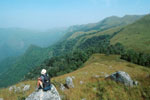Fifty years of oil spills in Nigeria’s now infamous Ogoniland region will take up to three decades and over a billion dollars ($1 billion for just the first five years) to restore environments to healthy conditions, according to a new independent report by the United Nations Environment Program (UNEP). The most thorough study to date has found that widespread pollution has hit the Niger Delta even harder than assumed with devastating impacts on fishing grounds and community health. Last week Shell, one of the biggest operators in Nigeria, admitted to two massive oil spills in 2008 totaling 11 million gallons of crude.
“The environmental restoration of Ogoniland could prove to be the world’s most wide-ranging and long term oil clean-up exercise ever undertaken,” the UNEP report reads.
The UNEP’s field report, which lasted 14 months, surveyed 200 locations, and analyzed 4,000 soil and water samples, was paid for by Shell after the Nigerian government called for an independent investigation. The investigation found at least 10 communities that were immediately at risk from drinking water polluted with hydrocarbons. Even in areas where the ground surface appeared healthy, the assessment found severe contamination below ground, sometimes going deeper than five meters. Many mangroves forests in the region, which local fishermen depend on since they serve as fish nurseries, are covered in bitumen (tar-like petroleum) a centimeter thick. The constant stream of pollution has pushed fish populations outward and devastated some aquaculture.
“The Ogoni community is exposed to hydrocarbons every day through multiple routes. While the impact of individual contaminated land sites tends to be localized, air pollution related to oil industry operations is all pervasive and affecting the quality of life of close to one million people,” reads a press release on the report.
UNEP officials found that one community had three inches of oil (eight centimeters) floating near their drinking wells. Testing the water, officials found levels of benzene 900 times above UN World Health Organization recommendation. A known carcinogen, benzene has been linked to leukemia. The community is near pipeline owned by the Nigerian National Petroleum Company, a state-owned oil company.
“The oil industry has been a key sector of the Nigerian economy for over 50 years, but many Nigerians have paid a high price, as this assessment underlines,” UNEP Executive Director, Achim Steiner said in a press release. “It is UNEP’s hope that the findings can break the decades of deadlock in the region and provide the foundation upon which trust can be built and action undertaken to remedy the multiple health and sustainable development issues facing people in Ogoniland.”
The UNEP is recommending that three new institutions are set up to oversee clean-up and that the billion-dollar price tag be met by oil companies and the Nigerian government.
For its part, Shell blamed most of the oil pollution on local communities. “Illegal refining and oil theft in the Niger Delta […] is the major cause of the environmental damage,” the oil giant stated on its website. The Nigerian National Petroleum Company told Reuters a similar statement, but said they would undertake clean-up measures. Shell has stated that it ‘welcomed’ the report. However, Amnesty International disagrees as to how the oil company is portraying its responsibility.
“This report proves Shell has had a terrible impact in Nigeria, but has got away with denying it for decades, falsely claiming they work to best international standards,” Audrey Gaughran, Global Issues Director of Amnesty, said in a press release. “Shell must put its hands up, and face the fact that it has to deal with the damage it has caused. Trying to hide behind the actions of others, when Shell is the most powerful actor on the scene, simply won’t wash.”
Also this week Shell was given preliminary go-ahead by the Obama Administration to drill exploratory oil wells near the Arctic Wildlife Refuge in the Arctic ocean, a move which was condemned by environmentalists and indigenous groups in the region. Shell is working on its oil spill plan.
Related articles
Saving (and studying) one of Nigeria’s last montane forests

(07/26/2011) Between 2000 and 2010, Nigeria lost nearly a third (31 percent) of its forest cover, while its primary forests suffered even worse: in just five years (2000 to 2005) over half of the nation’s primary forests were destroyed, the highest rate in the world during that time. Yet, Nigeria’s dwindling forests have never received the same attention as many other country’s, such as Indonesia, Brazil, Malaysia, or Peru, even though in many ways Nigeria struggles with even deeper problems than other developing nations. Despite vast oil business, the nation is plagued by poverty and destitution, a prime example of what economists call the ‘resource curse’. Environmentally, it has been named one of the worst in the world. Yet, not all forest news out of Nigeria is bleak: the success of the Nigerian Montane Forest Project in one of the country’s remaining forests is one such beacon of hope, and one example of how the country could move forward.
Nigeria moving forward on REDD to protect last remaining forests
(02/19/2011) The tiny state of Cross River, Nigeria, has managed to preserve large swathes of endangered rainforest despite lucrative – and often intimidating – offers from loggers and other interests. It’s also laid the groundwork for a state-wide program designed to earn international carbon credits by saving trees, thus securing its spot in an elite network of states that are moving forward as UN talks stall.
Nigeria has worst deforestation rate, FAO revises figures
(11/17/2005) Nigeria has the world’s highest deforestation rate of primary forests according to revised deforestation figures from the the Food and Agriculture Organization of the United Nations.